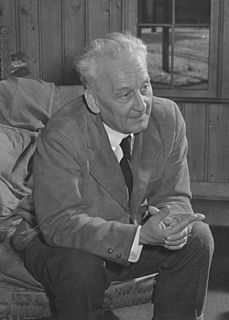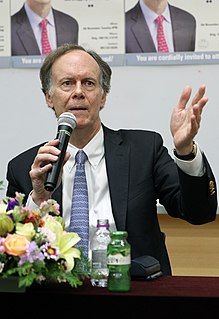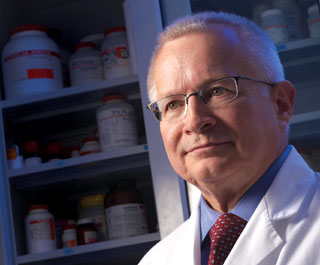Related Research Articles
Albert Einstein College of Medicine is a private, research-intensive medical school located in the Morris Park neighborhood of the Bronx in New York City. Einstein operates as an independent degree-granting institute since 2018, and is part of the integrated health care system, Montefiore Health System, which includes Montefiore Medical Center.

Dana–Farber Cancer Institute is a comprehensive cancer treatment and research institution in Boston, Massachusetts. Dana-Farber is the founding member of Dana–Farber/Harvard Cancer Center, Harvard's Comprehensive Cancer Center designated by the National Cancer Institute, and one of the 15 clinical affiliates and research institutes of Harvard Medical School.
NCI-designated Cancer Centers are a group of 71 cancer research institutions in the United States supported by the National Cancer Institute.
The Association of American Cancer Institutes (AACI) is a membership association of 102 academic and freestanding cancer research centers in the United States and Canada. AACI's membership roster consists of National Cancer Institute (NCI)-designated centers and academic-based cancer research programs that receive National Institute of Health (NIH) and NCI support.
James Lewis Abbruzzese is the Chief of the Duke Division of Medical Oncology and Associate Director for Clinical Research for the Duke Cancer Institute. Previously, Abbruzzese was Chairman of the Department of Gastrointestinal Medical Oncology at the University of Texas M. D. Anderson Cancer Center where he held the M. G. and Lillie A. Johnson Chair for Cancer Treatment and Research and the Annie Laurie Howard Research Distinguished Professorship. Abbruzzese is one of the world's leaders in the clinical study and treatment of pancreatic cancer.

Ronald A. DePinho was the fourth president of the University of Texas MD Anderson Cancer Center in Houston and is internationally recognized for basic and translational research in cancer, aging and age-associated degenerative disorders. He was inducted into the National Academy of Sciences in 2012.
Laurie Hollis Glimcher is an American physician-scientist who was appointed president and CEO of Dana-Farber Cancer Institute in October 2016. She was elected a Member of the American Philosophical Society in 2019.

The Szent-Györgyi Prize for Progress in Cancer Research, established by National Foundation for Cancer Research (NFCR) and named in honor of Albert Szent-Györgyi, Nobel Laureate and co-founder of NFCR, has been awarded annually since 2006 to outstanding researchers whose scientific achievements have expanded the understanding of cancer and whose vision has moved cancer research in new directions. The Szent-Györgyi Prize honors researchers whose discoveries have made possible new approaches to preventing, diagnosing and/or treating cancer. The Prize recipient is honored at a formal dinner and award ceremony and receives a $25,000 cash prize. In addition, the recipient leads the next "Szent-Györgyi Prize Committee" as honorary chairman.
Edward J. Benz Jr. is the former president of Dana-Farber Cancer Institute in Boston, Massachusetts., and the Richard and Susan Smith Professor of Medicine as well as a professor of genetics at Harvard Medical School.

William G. Kaelin Jr. is an American Nobel Laureate physician-scientist. He is a professor of medicine at Harvard University and the Dana-Farber Cancer Institute. His laboratory studies tumor suppressor proteins. In 2016, Kaelin received the Albert Lasker Award for Basic Medical Research and the AACR Princess Takamatsu Award. He also won the Nobel Prize in Physiology or Medicine in 2019 along with Peter J. Ratcliffe and Gregg L. Semenza.

The New York Genome Center (NYGC) is an independent 501(c)(3) nonprofit academic research institution in New York, New York. It serves as a multi-institutional collaborative hub focused on the advancement of genomic science and its application to drive novel biomedical discoveries. NYGC’s areas of focus include the development of computational and experimental genomic methods and disease-focused research to better understand the genetic basis of cancer, neurodegenerative disease, and neuropsychiatric disease. In 2020, the NYGC also has directed its expertise to COVID-19 genomics research.
Kenneth C. Anderson is an American hematologist-oncologist and cancer researcher who is primarily known for advances in the treatment of multiple myeloma. He directs the Lebow Institute for Myeloma Therapeutics and Jerome Lipper Myeloma Center at Dana-Farber Cancer Institute and is the Kraft Family Professor of Medicine and Vice Chair of the Joint Program in Transfusion Medicine at Harvard Medical School.

Daniel D. Von Hoff is the physician in chief and director of translational research at Translational Genomics Research Institute (TGen). He is also a professor of medicine at the Mayo Clinic and medical director of research as well as chief scientific officer at US Oncology. He is most notable for his work in targeted therapies for the treatment of cancer. He led the development of gemcitabine, and has several drugs in development.
Mary-Ellen Taplin, is a research oncologist at Dana Farber Cancer Institute and Brigham and Women's Hospital in Harvard's Longwood Medical and Academic Area.
Charis Eng, M.D., Ph.D., is a Singapore-born physician and geneticist at the Cleveland Clinic, notable for identifying the PTEN gene. she is a Fellow of the Ammerican Association for the Advancement of Science.
Judy Ellen Garber is the director of the Center for Cancer Genetics and Prevention at the Dana-Farber Cancer Institute and a professor of medicine at Harvard Medical School. Garber previously served as president of the American Association for Cancer Research.
Robert Alexander Belfer is an American oilman and philanthropist who is known for his stake in Enron and is the namesake of Belfer Center for Science and International Affairs at Harvard Kennedy School.
Catherine J. Wu is an American physician-scientist who studies oncology. She is a Professor of Medicine and Chief of Division of Stem Cell Transplantation and Cellular Therapies at the Dana-Farber Cancer Institute. Her research focuses on longitudinal studies of patients with chronic lymphocytic leukemia (CLL).
David "Neil" Hayes is an American oncologist and physician-scientist. He is the Van Vleet Endowed Professor in Medical Oncology and the division chief of haematology and oncology at the University of Tennessee Health Science Center. As a result of his research, Hayes was elected a Member of the American Society for Clinical Investigation.
References
- ↑ Ante, Spencer (2014-01-07). "IBM Struggles to Turn Watson Computer Into Big Business". The Wall Street Journal. Retrieved 2014-01-16.
- ↑ "Lynda Chin, M.D." University of Texas MD Anderson Cancer Center. Archived from the original on 26 February 2013. Retrieved 6 November 2013.
- ↑ "Institute of Medicine Elects Lynda Chin to Membership". The University of Texas MD Anderson Cancer Center.
- ↑ "Lynda Chin 'Powerful Force in Science'". The University of Texas MD Anderson Cancer Center. Retrieved 6 November 2013.
- ↑ "Lynda Chin, M.D. - Scientific Director". The University of Texas MD Anderson Cancer Center. Retrieved 6 November 2013.
- 1 2 3 4 5 6 "Lynda Chin, MD". Cancer Prevention and Research Institute of Texas. Retrieved 6 November 2013.
- ↑ "Anatomy of a grant: Emails indicate cancer agency sought to bypass scientific review". Houston Chronicle. Retrieved 2017-02-21.
- ↑ "Lynda Chin". TedMed. Retrieved 6 November 2013.